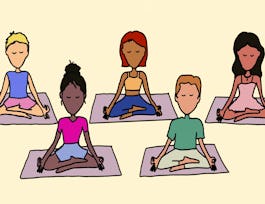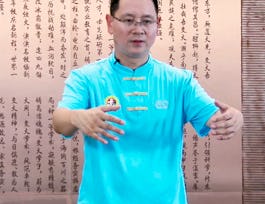This course gives you access to an exploration of physiological systems from the perspective of overall health and wellness. In particular, a focus on yoga, meditation and mindfulness as a therapeutic intervention in chronic illness and long term treatment. This course is intended for yoga practitioners and teachers, as well as college students and medical practitioners looking for a deeper understanding of the physiological benefits of yoga. The value of taking this course is to understand the impact that yoga can have on reducing stress, and aiding in healing or preventing physiological pathologies. Throughout this course, we will learn about different physiological systems and highlight yoga practices that can influence different systems and reduce pathology. Reading material will include analysis of scientific studies that have successfully utilized yoga practice as a tool for treatment of various illnesses such as: hypertension, stress, diabetes, insomnia, chronic pain and PTSD. In order to understanding these conditions, lectures will provide a complete understanding of the correlating physiological system. The weekly course assignment will include physiology lectures, a weekly yoga practice, suggested readings, and optional discussions for a total of 3-5 hours per week. The course will provide a tremendous amount of information and hands on experience for those interested in alternative health perspectives and a more in depth scientific understanding of this ancient healing method.


Engineering Health: Introduction to Yoga and Physiology
Taught in English
Some content may not be translated
60,489 already enrolled
(485 reviews)
What you'll learn
Identify the role, structure, and function of human physiological systems
Identify the the conditions and presentation of normal and abnormal functioning of human physiological systems
Examine underlying physiological mechanisms that connect healthy functioning to yoga practice
Practice yoga that targets therapy, prevention, and overall wellness
Details to know

Add to your LinkedIn profile
63 quizzes
See how employees at top companies are mastering in-demand skills


Earn a career certificate
Add this credential to your LinkedIn profile, resume, or CV
Share it on social media and in your performance review

There are 14 modules in this course
What's included
2 videos1 reading1 quiz
The focus of this module is to provide a basic understanding to the workings of the trillions of cells that make up our body. The lecture provides an overview of the functioning components of the cell, energy production and signaling network of our cells. This gives us the ability to understand how cells work, and their purpose to understand cell stress and related pathologies. The yoga component of this module introduces the basics to the practice to allows us to begin building healthier cell programming and reducing cellular stress.
What's included
4 videos3 readings5 quizzes1 discussion prompt
This module defines the basics of genetics in exploration of contributing factors to healthy chromosomes and genetic regulation. By explaining the role that stress can have on cells and chromosomal wellbeing, we provide a foundation for understanding how epigenetics can be affected by repetition and being to help to promote new regulatory factors.
What's included
7 videos5 readings6 quizzes1 discussion prompt
In this module we break down a scientific article, so that we can better understand the components of a peer reviewed research paper. In understanding the sections of the paper, what they contribute to the scientific paper and discovery. In addition, the reader should be able to identify major conclusions and results from this research paper, and future studies.
What's included
8 readings2 quizzes
In this module we will explore the basic components of the Nervous system from a cellular to a physiological level. Particularly, we will focus on the components of the nervous system that are aided by yoga and mindfulness modalities. The yoga aspect of the module will focus on supporting proper posture and minimizing back pain.
What's included
10 videos4 readings4 quizzes1 discussion prompt
This module presents an overview of the respiratory system including both the molecular functioning as well as the overall mechanisms of breathing. In understanding how and why we breath, students will have a deeper understanding of the role that breathing has in stress reduction, physiological well being and overall health. The yoga component of this lesson will focus on different breathing techniques that can be utilized to optimize wellness.
What's included
5 videos4 readings4 quizzes1 discussion prompt
The focus of this module is to provide a basic understanding of the cardiovascular system. The lecture provides an overview of the main components of the system, as well as the mechanisms behind muscle contraction. In order to understand associated pathologies, blood pressure is also highlighted in the class. The module features an interview with Dr. Marshall Hagins, who discusses the role that yoga and meditation can have on cardiovascular pathology such as hypertension. The yoga component of this module focuses on movement to increase circulation and increase your heart rate.
What's included
6 videos4 readings4 quizzes1 discussion prompt
The focus of this module is to provide a basic understanding and introduction to the lymphatic and immune systems. The lecture provides an overview of the main components of the lymphatic system; vessels, glands and lymph components. In addition, an overview of the immune system focuses on the primary component. These two interconnected systems are highlighted in order to understand lymph circulation as well as pathologies, such as autoimmune diseases and inflammation. The yoga component of this module focuses on postures that have sweeping movement to increase lymphatic circulation, and ones that promote a calm and healthy immune system.
What's included
5 videos3 readings5 quizzes1 discussion prompt
This module’s focus is to provide a basic understanding of the musculoskeletal system on both a physiological or macro level, as well as a micro level. In doing so, we will build an understanding of how yoga and meditation can help provide the foundation for a strong and health musculoskeletal system. In addition, this module features an interview with Orthopedic Surgeon, Dr. Michael Seidenstein, who will provide insight into how yoga can help treat and prevent orthopedic injury.
What's included
8 videos5 readings7 quizzes1 discussion prompt
The focus of this module is to provide a basic understanding and introduction to the renal system and highlight other excretory systems. The lecture provides an overview of the functioning components of the renal system, the nephrons. The ability to understand how nephrons work, and their purpose to understand pathologies, such as high blood pressure. The yoga component of this module focuses on forward and back bends that have the ability to promote kidney health.
What's included
4 videos3 readings5 quizzes1 discussion prompt
This module focuses on the overall purpose and structure of the digestive system organs, and the role of their accessory organs in digestion. We will explore yoga practices that can aid in promoting healthy digestion through movement. In addition, an overview of some pathologies associated with the digestive system, and how yoga can help enhance treatment.
What's included
3 videos4 readings5 quizzes1 discussion prompt
The focus of this module is to provide a basic understanding of the endocrine and the reproductive system. The lecture provides an overview of the main components of the endocrine system; hormones, glands and tissues/organs that are affected. In order to understand associated pathologies, specific hormones are highlighted in the class. In addition, the module goes over impact of long term stress with an in depth description of the HPA Axis. The yoga component of this module focuses on relaxing movement to decrease stress and promote a healthy endocrine system.
What's included
6 videos4 readings5 quizzes1 discussion prompt
The focus of this module is to provide a physiological understanding of the stress response. The lecture provides an overview of stress as controlled by the sympathetic nervous system and the HPA axis. This gives us the ability to understand how stress can impact our bodies on a cellular, as well as, systems level and discuss related pathologies. This module is enhanced by an interview with Dr. Marshall Hagins who discusses the impact of stress on general health as well as pain. The yoga component of this module introduces breathing and meditation techniques to decrease chronic stress, and improve our overall health.
What's included
5 videos3 readings6 quizzes1 discussion prompt
In this module we will integrate everything we have learned in the previous modules to enhance our overall health and wellness. The focus of this module is on practicing a short but complete practice, that can be done on a daily or weekly basis. This yoga practice was designed as part of a hypertension and yoga study, where it was able to reduce hypertension. Being able to integrate this complete practice into your daily lives is a perfect practical summary of everything that has been practiced.
What's included
1 video4 readings4 quizzes
Instructors



Offered by
Recommended if you're interested in Basic Science

Korea Advanced Institute of Science and Technology(KAIST)

Universidad de Palermo

Shanghai Jiao Tong University

Coursera Project Network
Why people choose Coursera for their career




Learner reviews
Showing 3 of 485
485 reviews
- 5 stars
85.21%
- 4 stars
12.32%
- 3 stars
1.02%
- 2 stars
0.20%
- 1 star
1.23%
New to Basic Science? Start here.

Open new doors with Coursera Plus
Unlimited access to 7,000+ world-class courses, hands-on projects, and job-ready certificate programs - all included in your subscription
Advance your career with an online degree
Earn a degree from world-class universities - 100% online
Join over 3,400 global companies that choose Coursera for Business
Upskill your employees to excel in the digital economy
Frequently asked questions
Access to lectures and assignments depends on your type of enrollment. If you take a course in audit mode, you will be able to see most course materials for free. To access graded assignments and to earn a Certificate, you will need to purchase the Certificate experience, during or after your audit. If you don't see the audit option:
The course may not offer an audit option. You can try a Free Trial instead, or apply for Financial Aid.
The course may offer 'Full Course, No Certificate' instead. This option lets you see all course materials, submit required assessments, and get a final grade. This also means that you will not be able to purchase a Certificate experience.
When you purchase a Certificate you get access to all course materials, including graded assignments. Upon completing the course, your electronic Certificate will be added to your Accomplishments page - from there, you can print your Certificate or add it to your LinkedIn profile. If you only want to read and view the course content, you can audit the course for free.
You will be eligible for a full refund until two weeks after your payment date, or (for courses that have just launched) until two weeks after the first session of the course begins, whichever is later. You cannot receive a refund once you’ve earned a Course Certificate, even if you complete the course within the two-week refund period. See our full refund policy.


